The recent court case surrounding the shocking robbery of reality TV star Kim Kardashian in Paris reveals a strange convergence of criminal ineptitude and social media scrutiny. Dubbed the "grandpa robbers," the aging gang's haphazard planning highlights both their desperation and lack of caution in targeting a global celebrity.
"The Unlikely Robbers: How Kim Kardashian's Heist Involved 'Grandpa Robbers' and Misguided Crime Planning"

"The Unlikely Robbers: How Kim Kardashian's Heist Involved 'Grandpa Robbers' and Misguided Crime Planning"
A deeper look into the notorious robbery of Kim Kardashian, revealing the culprits' identity, mistakes, and the broader implications of such criminal acts.
The night of October 2, 2016, marked a significant event in the intersection of celebrity culture and crime. In a luxurious Paris apartment, reality TV star Kim Kardashian was held at gunpoint by a group of thieves later nicknamed the "grandpa robbers," who were largely unaware of their high-profile victim's identity. This gang, which included the 62-year-old Yunice Abbas, faced a trial that points to both their comedic criminal failings and Kardashian's public vulnerability as a global figure.
In the aftermath of the theft, which saw over $10 million worth of jewelry taken—including a $4 million engagement ring—the culprits' blunders showcased a profound misunderstanding of both security protocols and effective crime planning. The gang, comprising members born in the 1950s, led investigators to question how such seasoned criminals botched such a high-stakes heist. Many were quick to label them as "losers" who could not match the audacity required for a target like Kardashian.
Despite the chaos of their planning, details of the robbery reveal an intricately woven narrative of poor judgment, not just on the part of the robbers but also regarding Kardashian's own security measures. As the burglars dressed in police garb burst into Kardashian’s room while she was resting, their failure to assess changes in law enforcement methodologies or even the prevalence of security cameras in Paris led to unexpected consequences. In hindsight, Abbas himself expressed trepidation regarding the trial, reflecting on the weight of his past choices.
Furthermore, court proceedings have drawn attention to deeper questions surrounding the reliability of modern information flows. Investigators suspect that the gang may have leveraged insider information, possibly from a transportation assistant linked to the Kardashian family, indicative of a cultural clash between an elite celebrity and the robbing misfits.
As the trial unfolds in Paris, Kardashian is expected to testify, allowing for a renewed focus on personal safety and the darker side of fame. In weighing celebrity justice against the historic background of the thieves, this case raises pressing issues about crime, celebrity culture, and the evolving dynamics of modern society as it contemplates the consequences born of social media's reach.






















